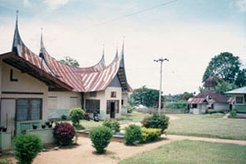Changing Constellations of Legal Pluralism in West Sumatra, Indonesia (jointly with Prof. Keebet von Benda-Beckmann)
The empirical research focuses mainly on Indonesia. The main theme concerns the shifting relationship between the various bodies of law: state law, customary law, called adat law, and religious law, both in its local variants and in its official form. The shift is on the one hand studied as a long-term historical process, in which phases of gradual adjustment alternate with phases of rapid change. Currently Indonesia goes through a period of rapid and fundamental political change, which has triggered off fierce debates about the role of each of the legal systems. This poses a unique and timely opportunity to study processes of socio-economic and political change about shifting constellations in a complex plural legal system, about a changing role of the state and its component organisations, and about the relationships of individuals, communities and the state. The project has two components:
Decentralisation of the State Administration: Consequences for Village Administration, Social Security and Resource Rights

In response to the increasing pressure from regions claiming more autonomy, and to the monetary and financial crisis of the mid 1990s, Indonesia has embarked on a major process of decentralisation. This policy is also enforced and supported by the International Monetary Fund and the World Bank who wish to create a leaner, effective, responsible and more democratic administration. Bilateral donor agencies also support the policy; they see a possibility to bring about a form of governance that is closer to the local population. West Sumatra is one of the most advanced regions in this process, thus offering a good opportunity to study the social, political and legal consequences. The Minangkabau case is in particular interesting, as decentralisation coincides with a territorial restructuring of local administration. A first analysis of this process suggests that the effects reach far beyond a simple devolution of decision making powers to lower levels of authority. The so far strictly hierarchical structure of Indonesia's state administration seems to be developing into a one that combines hierarchical and horizontal features.

The new form of local administration involves a return to an older form of local administration that goes back to pre-colonial nagari, villages with a relatively high degree of autonomy. This nagari structure over the past 150 years has gone through many changes imposed by the colonial and later the Indonesian central government. Returning to the nagari system thus may have many different meanings. One of the questions of the research is in what ways and in whose interests history is being reconstructed in order to establish claims for positions of authority in the future. This process involves renegotiating the relationship between adat (local customs and customary law) and the state and its law. However, there are signs that the process also affects Islamic leadership and the role of Islamic law both in its official and its local variants. The study thus offers a good opportunity to look into the social working of law in a period of a changing constellation of legal pluralism. The project also intends to look at the involvement of donor agencies and their notions of good governance, community based resource management, grass root governance and alternative dispute resolution that seem to be imputed in their services.

Decentralisation also has important consequences for the situation of social security. Social projects have been an important way in which financial support from the central government was channeled into the regions down to the local level. They were, together with public works and education, one of the most important means through which the centre could maintain its hierarchical structure through a patronage system. The abolition of the Department of Social Affairs was not only an important symbolic gesture in the fight against corruption and political patronage, it also cut off many socially weak from important support. And that happened at a time when locally circles of persons who can be called upon for help in times of need were contracting. First results of our research suggest that slowly adjustments are being made, but our initial hypothesis that Islamic organisations become more active in this field does not seem to hold. But there are indications of considerable involvement from the private sector and from migrants who invoke Islamic and customary principles for their commitments.
Decentralisation also has a great impact on resource management, in particular land, water and forest. Instead of the old centralised redistribution of resources, regions and local communities have been given more autonomy in terms of income generation. This has resulted in increasing claims, based on customary adat law, on the government and on private commercial owners of natural resources to hand back land and water that had been taken from the local population under colonial rule or under the Suharto regime, but had remained contested until the present. Many land claims have been filed in court and villages and villagers are negotiating with higher authorities and with private companies for returning rights to natural resources or participation in their proceeds.
Finally, there are indications that decentralisation leads to unforeseen processes of exclusion. This seems to happen at the regency level, where a process of ethno-genesis is taking place. But it also happens at the local level, where old and partially forgotten differences between original settlers and latecomers or former slaves are reviving, leading to an increase of social stratification.
The research is carried out in close cooperation with Andalas University in Padang and with the Centre for Population Studies in Yogyakarta. Furthermore, there is close cooperation with the programme on "The impact of crisis in Indonesia" of the Dutch Royal Academy of Sciences, in which the University of Nijmegen, Utrecht, Amsterdam and the Institute of Social Studies in The Hague participate. For preliminary results see F. and K. von Benda-Beckmann 2001, 2005, 2006 a and b, 2007 a and b.


